
20th November 2022 –
Thirty Fourth Sunday – Our Lord Jesus Christ, King of the Universe – Year C
Gospel Text: Luke 23:35-43
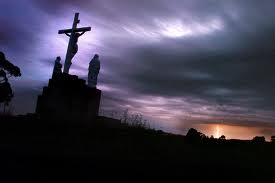 vs.35 The people stayed there before the cross watching Jesus. As for their leaders, they jeered at him, saying:
vs.35 The people stayed there before the cross watching Jesus. As for their leaders, they jeered at him, saying:
“He saved others, let him save himself if he is the Christ of God, the Chosen One.”
vs.36 The soldiers mocked him too, and when they approached to offer him vinegar
vs.37 they said, “If you are the king of the Jews, save yourself.”
vs.38 Above him there was an inscription: “This is the King of the Jews.”
vs.39 One of the criminals hanging there abused him. “Are you not the Christ?” he said. “Save yourself and us as well.”
vs.40 But the other spoke up and rebuked him. “Have you no fear of God at all?” he said. “You got the same sentence as he did,
vs.41 but in our case we deserved it: we are paying for what we did. But this man has done nothing wrong.
vs.42 Jesus,” he said “remember me when you come into your kingdom.”
vs.43 “Indeed, I promise you,” he replied “today you will be with me in paradise.”
************************************************
We have four sets of homily notes to choose from.
Please scroll down the page to read them.
Michel DeVerteuil : Fr. Michel, , fmr director of the Centre of Biblical renewal .
Thomas O’Loughlin: Thomas is on the theology faculty of Nottingham University
Sean Goan:Sean studied scripture in Rome, Jerusalem and Chicago and teaches at Blackrock College and works now with Le Chéile.
Donal Neary SJ: Donal is editor of The Sacred Heart Messenger
*******************************************************
Michel de Verteuil
Lectio Divina The Year of Luke
www.columba.ie
General Textual comments
In order to enter into the celebration of today’s feast, two points need to be clarified.
The first concerns the meaning of “kingship” in this context. In modern Western culture, kings and queens do not exercise much power; in the Bible, however, their power is absolute. What we are celebrating in today’s feast, then, is the power of Jesus – who never used his power to his own advantage.
Secondly, this power, real and effective though it is, is very different from power as the world understands it. We must not therefore presume that we know what we are celebrating. The feast is rather an occasion to discover (or re-discover) the power of Jesus, how it works and what are its effects, so that we can celebrate it.
The rediscovery will be a true celebration as we experience that Jesus’ way of exercising power – the divine way – is good news for us as individuals and as communities, including the entire human family. It will also be a call to conversion as we become aware of how little this kind of power is known and practiced, even by Jesus’ followers. We will also feel a longing for the coming of God’s kingdom – a new civilization based on this kind of power.
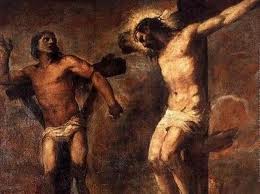 We repent for the way we Christians have misrepresented the power of God, portraying him to the world as a despot, and often a cruel one, “not fully mirroring the image of our crucified Lord, the supreme witness of patient love and of humble meekness” (Tertio Millennio Adveniente).
We repent for the way we Christians have misrepresented the power of God, portraying him to the world as a despot, and often a cruel one, “not fully mirroring the image of our crucified Lord, the supreme witness of patient love and of humble meekness” (Tertio Millennio Adveniente).
It is an occasion to celebrate the great models of Jesus power of our century. We remember concrete scenes:
Gandhi clothed in his homespun dhoti, standing before the British viceroy;
Pope John Paul on his first visit to Poland as pope;
Nelson Mandela leaving prison;
Mother Teresa working with the poor and dying in Calcutta
The power of truth, of honesty, of forgiveness – with no frills! How different the world would be if it was governed by this kind of power!
We are led to consciousness of Jesus’ power through lectio divina.
Meditating on the Bible text we remember with deep gratitude moments when people entered our lives exercising his kind of power; other moments when by God’s grace we have been able to exercise it ourselves, as parents, church ministers, fellow-workers, friends. These moments are for us “seeds of the kingdom.”
This year, the gospel reading on this feast day invites us to enter into the extraordinary paradox – Jesus exercises power as he hangs on the cross. We enter the lowliness first – at the level of our feelings, as always in lectio divina. We feel for Jesus hanging between two criminals, “one on the right and the other on the left,” as St Luke puts it dramatically in the previous verse; there is no question of Jesus’ cross being slightly higher than the others, as in some representations of the scene. He is mocked by the leaders and the soldiers and by one of the criminals. Their humiliating taunt is true: he saved others, now he cannot save himself. We allow the text to remind us of similarly humiliating situations.
Our meditation then moves in one of two directions. We can celebrate great people who, like Jesus, enter freely into that lowly state so that they can exercise his soft power:
– leaders share their weaknesses with members of their communities;
– religious men and women choose to live among the poor and the vulnerable;
– groups like Alcoholics Anonymous have as their basic principle that all members must confess their addiction;
– the Church confesses its sins to other religious bodies and to the world.
More often people are brought into that situation – usually against their will – and by their faith they make it an experience of Jesus power:
– parents remain faithful to their children even when they see the children sent to prison, victims of drugs, rejecting their parents’ values;
– spouses maintain their dignity when deserted by their partners;
– we grow in compassion through falling into a sin we thought we had done with;
– our Church becomes more humble as it becomes engulfed in sex scandals;
– a political party is able to purify its goals because its members have been discovered to be corrupt.
The passage invites us to celebrate the effect of Jesus power: the lowly are lifted up, “set in the company of princes” (Psalm 113:8).
 The good thief is the perfect symbol of this process, and we must enter with deep emotion into his moment of grace. Up to then he was nobody. Now, because Jesus shares his lowly fate, he has his moment in history, he enters into his truth. Jesus thanks him for his faith (how he needed that!) and they enter into paradise together, companions in faith.
The good thief is the perfect symbol of this process, and we must enter with deep emotion into his moment of grace. Up to then he was nobody. Now, because Jesus shares his lowly fate, he has his moment in history, he enters into his truth. Jesus thanks him for his faith (how he needed that!) and they enter into paradise together, companions in faith.
We can read the passage from either perspective – that of Jesus or that of the thief. We celebrate times when our failures brought us into communion with those we looked down on; other times when someone we were in awe of shared their story with us and we discovered our own greatness, perhaps for the first time.
It would be good to spend some time letting ourselves be touched by the setting of the story. This is a unique moment in human history – God’s power at its height; a sacred moment, too, when the great high priest is reconciling the world to God. But what do we see? Two human beings standing by each other, nothing more! What a judgement on how the world judges greatness – or holiness – whether of people or of places!
Reflection Prayers
Lord, we thank you that you showed us in Jesus the true meaning of power.
He exercised kingship by coming among us as a companion,
sharing our terrible experiences of lowliness,
of hanging on a cross with two criminals, one on our right and the other on our left,
having people jeer at us that we who are your anointed, specially chosen by you,
we who in many ways bring salvation to others, are unable to save ourselves or our families.
Now we can share with you the pain
of having those who looked up to us as leaders in the community
angry with us because we could not save ourselves and them as well.
Give us the grace to follow in Jesus’ footsteps,
turning our moments of lowliness into moments of power,
when we enter into communion with those in need, proving the values of the world wrong,
for when we learn to accept that we cannot save ourselves,
we bring salvation to all those who are being crucified.
Lord, we pray that your Church may not stand aloof from the world,
But be willing like Jesus to share the fate of the poor,
To accept hanging on the cross with them,
Alongside criminals at times, some on the right, some on the left.
Hanging there, your Church will experience mockery as Jesus did,
from religious leaders as well as ordinary foot soldiers,
will be abused by those who look for quick solutions to their problems,
but will discover heroic people among those whom the world has condemned
and will enter paradise walking hand in hand with them.
Lord, we thank you for people who have been for us what the good thief was for Jesus.
Whereas others rejected us because we could not save them,
They saw that we had done nothing wrong to deserve the harsh sentence we had received, called us tenderly by our names
and asked us to be remembered among our friends.
 Lord, we thank you for addicts who join rehabilitation groups like Alcoholic Anonymous or other addictive treatment projects
Lord, we thank you for addicts who join rehabilitation groups like Alcoholic Anonymous or other addictive treatment projects
Like the good thief, they experienced disgrace but continued to fear you.
Then one day they stopped abusing others for their plight
and recognized that they deserved the sentence of condemnation they had received from family and friends,
And that they were paying for the evil they had done.
Very humbly, they turned to the Jesus you sent to share their pain
And asked to be admitted into the company of the converted.
They received the assurance that on that very day they would enter into your kingdom.
Lord, we pray for those who feel excluded
– from positions of power because they have failed in their professional or personal lives,
– from the Church because of failures on their personal relationships.
We pray that they will discover greatness and holiness in themselves
By contemplating Jesus on Calvary
– a king with no royal throne,
– a priest with no temple or altar of sacrifice,
just himself and good people who share in his integrity, willing each other into paradise.
***********************************************
Thomas O’Loughlin
Liturgical Resources for Year C (Luke)
www.columba.ie
Introduction to the Celebration
Way back in January we began the year by celebrating the Baptism of Jesus when a voice was heard calling him ‘the beloved Son’. During the year we have greeted Jesus under all the views of him we find in the gospels. Now today, at the end of the year, we greet him with the all-embracing title: Jesus Christ, Universal King.
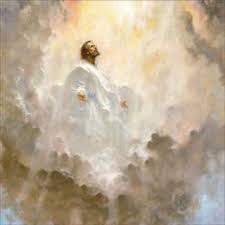 The Christ is the one who will gather us all together at the end of time, the one who will judge the living and the dead, and then present his kingdom to the Father. In our pilgrimage of faith that kingdom of justice, truth, and peace is to be our beacon, and Christ our guide. But before we join Christ in his banquet, we must ask pardon for the times when we followed other paths and other ways, when we listened to false prophets of greed and materialism, and for when we have failed to work for the coming of the kingdom.
The Christ is the one who will gather us all together at the end of time, the one who will judge the living and the dead, and then present his kingdom to the Father. In our pilgrimage of faith that kingdom of justice, truth, and peace is to be our beacon, and Christ our guide. But before we join Christ in his banquet, we must ask pardon for the times when we followed other paths and other ways, when we listened to false prophets of greed and materialism, and for when we have failed to work for the coming of the kingdom.
Gospel Notes
This is Luke’s crucifixion scene immediately before his account of the Jesus’ death and to appreciate it we need to break it into two parts:
first, vv 35-39; and second, vv 39-43 (v 39 forms the link between the two parts).
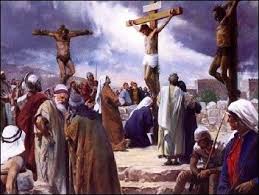 The first section is made up of the various groups that mock and revile Jesus as he hangs on the cross and its content is found in all three of the synoptics. However, while Matthew follows Mark in both content and sequence, Luke re-arranges the material. Why he does this is not clear.
The first section is made up of the various groups that mock and revile Jesus as he hangs on the cross and its content is found in all three of the synoptics. However, while Matthew follows Mark in both content and sequence, Luke re-arranges the material. Why he does this is not clear.
The second part of this scene suggests that he wants to create a deliberate contrast between the expectations of those who mock Jesus as a fraud and the genuine way that the Royal Son of God, the Christ – when he is actually with humanity – behaves in history.
The key transition moment is v 39: ‘One of the criminals who were hanged railed at him, saying, “Are you not the Christ? Save yourself and us!” What is remarkable here is that in Mark and Matthew it is both of the robbers on either side of him that revile him. Luke takes the scene of the three crosses (23:33 II Mk 15:27; Mt 27:38, Jn 19:18) and makes it a scene for the fundamental human decision. In Mark and Matthew there are no words given to those crucified with Jesus, so the whole section vv 39-43 is found only in Luke. One behaves exactly like the chief priests, elders and soldiers and mocks Jesus using their very words — we have to note the irony here that he sides with the persecutors of Jesus who are also his own persecutors, rather than with a fellow sufferer. In extremis, he can still only think of himself and his own perceptions of what God should be. The world of his selfishness and his demands is the only universe that exists. Then there is the contrast of the other criminal who can see both himself, his predicament, and the predicament of all three of them, and can ask for mercy.
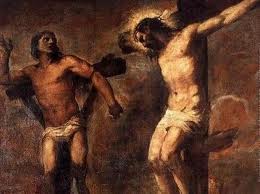 This petition from the ‘good thief’, as he has become known in the tradition, then brings out Luke’s even deeper irony: the false perceptions of the Christ and of the Royal One elicit nothing; but the call in need elicits the divine words of mercy: ‘Today you will be with me in paradise.’ The irony points to the paradox at the heart of the mystery of the incarnation in Luke that can be seen from his crib scene (2:7) right through to this moment: there are the expectations of power, might, and noise from the Christ of God, yet there is silence, suffering and powerlessness. When there is a divine judgement, a word of divine power (‘truly, I say to you’), and a display of divine knowing, it comes in response to a cry of need from a suffering criminal, on his own cross,
This petition from the ‘good thief’, as he has become known in the tradition, then brings out Luke’s even deeper irony: the false perceptions of the Christ and of the Royal One elicit nothing; but the call in need elicits the divine words of mercy: ‘Today you will be with me in paradise.’ The irony points to the paradox at the heart of the mystery of the incarnation in Luke that can be seen from his crib scene (2:7) right through to this moment: there are the expectations of power, might, and noise from the Christ of God, yet there is silence, suffering and powerlessness. When there is a divine judgement, a word of divine power (‘truly, I say to you’), and a display of divine knowing, it comes in response to a cry of need from a suffering criminal, on his own cross,
Homily notes
1. A good starting point today is to try to get the assembly to see what images – not their theological theories or soundbites from a catechism – the words ‘the End of the World’ bring to their minds.
First, it is not something that people like to dwell on;
Second, there is a natural fearfulness about the future in most people;
Third, there is legacy of apocalypticism in western culture; and fourth, disasters that are looming is big business in our society.
2. It depends on the size of the gathering and on how used they are to homily-experiences other than the talking head as to how people access these images. If they can talk about it, or if even a few people can give their images, it will be a much richer learning experience than if one just says: ‘Now think about this for a moment.’
3. The likelihood is that many will have images that portray the universe as a dangerous, unfriendly place, indeed, a place where God is either just an impersonal force or else the Juggernaut of vengeance. It is part of our complexity as human beings that we can say ‘God loves each of us’ – and mean and believe it – while at the same time having images deep within our consciousness of the cosmos that imply that God does not care or is cruel judge. Having that mind of Christ is not something that just happens when we accept a creed; it is a slow process of love and conversion.
4. It is worth dwelling on the sources of fear and giving them names.
5. We tend not to like to think far into the future – it brings up the thoughts of times of loss and death. This is something that seems common to all of us: we want to put the future beyond tomorrow or after the next few years’ on the long finger’. Many do not like thinking about retirement, pensions or making a will.
6. We have another natural, and seemingly universal, fear of the future: if the future is open, then things can go right or they can go wrong. This is the fear that makes us prudent and it is also the frisson of excitement when we make a bet. The future is a challenge to us and we are fearful lest we fail. We have all felt this whether it is before a test, or before doing something in public, or even trying to figure out the way to fill in a form we have just been sent.
7. There is a long tradition of using the images of disaster as part of the Christian message: God will come with fire and brimstone, and punish the wicked. We have to simply acknowledge this and ask is it the only Christian image?
8. A looming disaster is big business. We are all offered far more insurance than we need on every conceivable bit of kit we have. Movies and newspapers all need to hear about the latest disaster that is about to befall us. Governments use fear of ‘the threat’ from some vague other group or disease as a way of forming and justifying policy. It is much easier to lead by seeming to react to threat than to have a positive vision.
9. Now contrast the image of Christ as the one who hands back a kingdom brought to perfection in him through his love and forgiveness, to the Father. Christ is the omega point of our existence in his love and forgiveness.
1 0. Just such a contrast of expectations is at the heart of today’s gospel: the accusers think they know how the Christ will or should behave; but the reality is radically different. Today’s doom mongers are just as certain about the end, but we celebrate the end as Christ being all in all, ruling over all in love, and establishing peace. At this point it might be word reading the central section of today’s preface.
0. Just such a contrast of expectations is at the heart of today’s gospel: the accusers think they know how the Christ will or should behave; but the reality is radically different. Today’s doom mongers are just as certain about the end, but we celebrate the end as Christ being all in all, ruling over all in love, and establishing peace. At this point it might be word reading the central section of today’s preface.
11. Where do we see a foretaste of that omega point: in today’s gospel. The end of the Christ in our bodily existence is not a moment of vengeance, but of love towards one suffering with him: ‘Today you will be with me in paradise.’
12. Lastly, we need to acknowledge that many religious people do not like this vision of the End as it seems to make ‘God’ too soft and too soppy. A God of power and justice seems a more robust being than one of love and forgiveness. And these people seem to be in the majority among the shareholders of religion TV stations. But does this ‘robustness’ belong to the very group that Luke sees being rejected for their images of the Christ in today’s gospel?
*******************************************
Sean Goan
Let the Reader understand
www.Columba.ie
Gospel Notes
The last Sunday of the year is always celebrated as the Feast of Christ the King and in each year of the liturgical cycle we are invited to ponder some aspect of Christ’s rule over the church and indeed all creation. In year C we have been reading the gospel of Luke over many Sundays and have been privileged to see how the great mystery of God’s universal love and mercy is revealed in the person of Jesus. It is appropriate then on this feast to focus on Jesus on the cross granting pardon to the repentant thief. 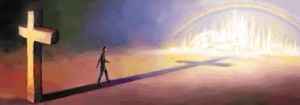 For Luke this aspect of the kingdom of God has been central: Jesus has come to bring the healing forgiveness of God to all who seek it.
For Luke this aspect of the kingdom of God has been central: Jesus has come to bring the healing forgiveness of God to all who seek it.
Reflection
‘If you are the king of the Jews then save yourself.’ This cry of mockery from the crowds on Calvary is worthy of our reflection on a feast such as today’s. It is precisely because he is the king of the Jews, and indeed king of the whole world, that Jesus does not save himself. He is more concerned to save others. This he does, not by the majestic use of power or a dramatic manifestation of his glory, but rather through a humble giving of himself in which the mercy of God is offered to everyone in an act of overwhelming generosity. Today we celebrate a king whose wealth lies in his love for all, and whose authority is exercised through service of those who are considered the least important of all. Jesus does not seek servants who grovel before his throne in the hope of being granted favours, he is looking for disciples who can stand before the cross and see there their own worth and the worth of every other human being, and who will be prepared to do what they can to uphold the dignity of their brothers and sisters.
********************************
Donal Neary SJ
Church Reflections, Year C
www.messenger.ie/bookshop/
Feast of Christ the King
Jesus couldn’t do much for the man on the cross… his own hands were nailed. He couldn’t take him off, but he gave him more than he could ask for. He gave him paradise.
Where is God in our suffering? What sort of hope can we find this week in our country? What with so many horrible atrocities taking place, and the economic mess we have. What has God and the Church to say? God in his love for his people, and the Church with its social teachings – have they any message of hope?
Where is God? God did not cause the recession nor murders. We may learn a lot through it and good may come later or now. Our suffering at the moment is of human making. Not of our making, but of some of our leaders and bankers, mostly through greed. God is with us suffering like he was with the thief. He didn’t cause the suffering of the man on the next cross to him. He wants our happiness and wants justice and prosperity for all.
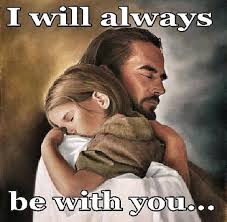 God is with us, holding our hands, asking us to support each other. The Church will offer a place and space to find the love of God, and its social teaching will ask us to look for the common good in the future. It offers also a place where we can hear the Church’s approach to our economic future, reminding us all the time of the needs of the poor and the ordinary in education, medical care, housing and the ways in which the very old and the poor will suffer most in a situation which has been none of their doing. We are the Church and called on to make our voices heard for those who, like the man on the next cross, have little voice except to ask for help.
God is with us, holding our hands, asking us to support each other. The Church will offer a place and space to find the love of God, and its social teaching will ask us to look for the common good in the future. It offers also a place where we can hear the Church’s approach to our economic future, reminding us all the time of the needs of the poor and the ordinary in education, medical care, housing and the ways in which the very old and the poor will suffer most in a situation which has been none of their doing. We are the Church and called on to make our voices heard for those who, like the man on the next cross, have little voice except to ask for help.
Lord, thy kingdom come.